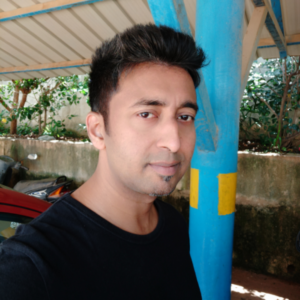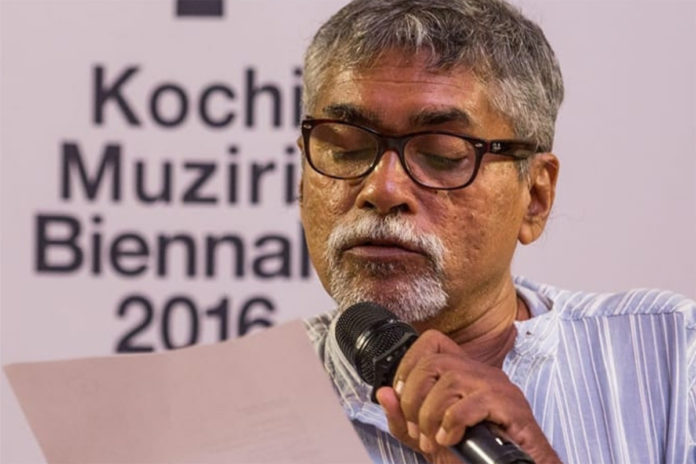Malayalam Poetry in Translation Series – 14
Translated by Aditya Shankar
The history of modern Malayalam poetry is a narrative of continuous innovation, gradual emancipation from the formalistic grip of traditional Sanskrit poetic practice, growing awareness of contemporary social issues and the ongoing democratization of the genre in thematic as well as formal aspects. In the process, paradigms have been tried and abandoned, communities imagined and dissolved, traditions constructed and deconstructed, the concepts of the region and the nation alternately tried out, the impact of foreign literatures absorbed and transcended, the classical and the folk heritage explored one after the other, fresh genres and formal devices employed and indigenized and the concept of the avant-garde transformed from one generation to the next. (Extract from the article ‘Malayalam Poetry Today’ by K.Satchidanandan)
*
Father and Dog
My father whose cheeks
dulled on seeing me,
transformed into the grin
of a squeezed smiley ball;
He used to love a dog,
gifting it a morsel and a whack.
The dog used to wag its tail.
Why did my father
love the dog instead of me?
I can understand.
Feed a morsel,
he could turn charitable.
Whack it,
he could turn a tyrant.
The dog will wag its tail.
It is challenging to raise a human kid.
On a white cement wall
that consumes
ten mandays of labour,
he might doodle with charcoal.
(Translation of Appanum Pattiyum, Page 42, Cheruth Valuthaakunnath, DC Books)
Machine and My Life
Went to the Coconut Research Centre
in a motorcycle,
bought a sapling
guided the vehicle loaded with saplings,
driving the motorcycle
sped on the motorcycle,
sought and found a labourer
went on a motorcycle
to buy fertilizers
planted the saplings
applied fertilizer
watered
the saplings sprouted
need to give
five or six tender coconuts to mom
secured a bunch of tender coconuts
on the motorcycle,
went to see mom
this machine
of nuts bolts chains
and of little rust
is half my body,
the ideal soil
for my model coconut farming.
(Translation of Yanthravum Ente Jeevithavum, Page 17, Yanthravum Ente Jeevithavum, DC Books)
Washing Machine, A Love Poem
It is easy to talk to someone these days
there is nothing much to say, to listen
It’s much easier through the phone
No need to look at a face
to ask
in which class is your son or
what’s happening,
to say
that I’m immersed in reading Harry Potter
that he or she began wearing jeans ripped at the back.
We can keep rambling.
The talk between C and D is mostly
a copy of a such a talk
that happened between A and B,
with minor modifications.
DaVinci Code instead of Harry Potter
entrance examinations and so on.
But humans are romantics
a naughtiness perishes deviates
one from the permitted path
haven’t seen you in a while, says she
why should i come is the reply
silence is fragrant
dream is the same dream
I do not know of any good word
closer to soul
in this life of solid matter.
No state is constant
a matter of moments, the stink spreads
else, I would have admitted my love
then the world wouldn’t function this well
Some issue with the washing machine
I will call you later,
the flirting ended.
Thanks to the washing machine
for prolonging the pain and fragrance of the unsaid
till the day our zillion stars burn out.
(Translation of Washing Machine Oru Pranaya Kavitha, Page 53, Yanthravum Ente Jeevithavum, DC Books)
About the Author:
N.G. Unnikrishnan is a poet and translator in Malayalam. He has four collections of poems and two translated works published by DC Books. His poems translated into English have appeared in IL, Muse India and in other online magazines. His poems are included in anthologies like Kavithayude Noottand (Malayalam Poetry from 1900 to 2000), and Vettuvazhi Kavitakal. A retired Associate professor, he is now a freelance writer. He lives in Kaitharam, Ernakulam District.
About the Translator:

Aditya Shankar is a Pushcart Prize and Best of the Net nominated poet, flash fiction author, and translator. He edited Tiny Judges Shall Arrive (AHRC, Hong Kong), a selection of KG Sankara Pillai’s poems translated into English. His translations have appeared in the SAARC anthology of poetry, Muse & Murmur, Modern Poetry in Translation, Ethics in Action and elsewhere. His poems have been translated into Malayalam and Arabic and published from 20 or more nations. His poetry collections include After Seeing (2006), Party Poopers (2014), and XXL (Dhauli Books, 2018). His short films have participated in International Film Festivals. He lives in Bangalore, India . (https://adityashankar.ucraft.net/).
















